 I couldn’t help but compare this book to Robert Fisk’s epic The Great War For Civilisation. James Barr’s book covers the conflict in the Middle East from the Anglo-French meetings in the first world war up to Israeli independence in 1948. Fisk’s book featured his experiences of the Russian and American wars in Afghanistan, the Gulf War, Iraq, the Algerian civil war, Israel, Syria, and whatever bits of Lebanon that didn’t make it into his previous book, Pity the Nation.
I couldn’t help but compare this book to Robert Fisk’s epic The Great War For Civilisation. James Barr’s book covers the conflict in the Middle East from the Anglo-French meetings in the first world war up to Israeli independence in 1948. Fisk’s book featured his experiences of the Russian and American wars in Afghanistan, the Gulf War, Iraq, the Algerian civil war, Israel, Syria, and whatever bits of Lebanon that didn’t make it into his previous book, Pity the Nation.
Fisk’s book is much more personal. There may be flaws or mistakes, but he is passionate, opinionated, and well informed. It is a devastating read in places. A chapter into his father’s experience with a firing squad in World War One provides context. Jumping from the Armenian Genocide, to torture in Algeria and then to his own investigations into arms manufacturers – it’s not a light read. It is however very, very engrossing.
James Barr’s book has a lighter tone (most things would in comparison to Fisk) and a tendency to focus on historical character, with the distance that seventy plus years can give. It reads like a disaster slow unfolding (especially since we know the current state of things), but there are easier moments (the eccentricities of Orde Wingate or the adventures of T.E Lawrence). Both books have a running theme of mismanagement from the western powers – uninformed decisions, petty diplomacy and careerist politicians and bureaucrats who have landed the role and can’t wait to leave (mixed with the occasional maverick fighting for their own pet cause).
The distance makes Line In The Sand an easier read, and it may have been easier for Barr to write, but ultimately it is a sad prequel to the modern situation in the region. Both books are well written and even handed accounts of the 20th (and 21st) century history of the region, and definitely worth reading.
Advertisements Share this:




